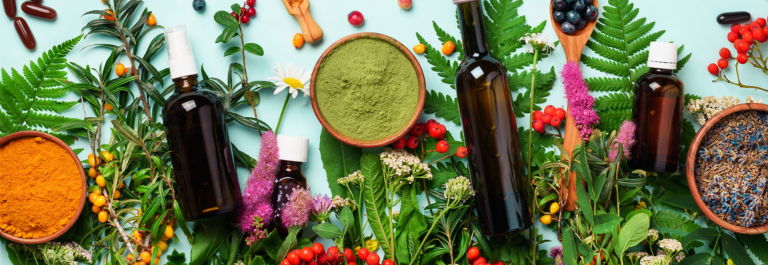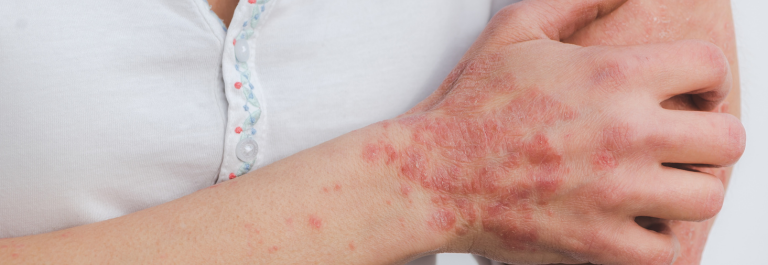Psoriasis is a chronic skin condition caused by an immune system response that attacks healthy skin cells. For people with psoriasis, skin cells are produced faster than they can be shed, causing inflamed, scaly patches where excess skin cells build up.
Suppose you experience psoriasis on body parts such as your knees, elbows, and scalp. In that case, there is an increased likelihood that you will also develop genital psoriasis at some point over your lifetime.
This uncomfortable hidden skin condition can take a toll not only on your physical health but on your mental health too. That's why throughout this post, we'll break down everything you need to know about:
-
Genital psoriasis symptoms
-
The causes of psoriasis patients
-
Approaches for treating genital psoriasis, including self-care and natural treatment options
Keep reading to learn more about how to cope if you or a loved one develops genital psoriasis.
Psoriasis Skin Symptoms
There are three common types of psoriasis. These include:
-
Plaque psoriasis - This variant accounts for 80% of all cases. It is characterized by dry, scaly skin lesions built up of excess skin cells. People with this form of psoriasis tend to experience intense itching and dandruff-like flaking of the skin, as well as cracked skin and bleeding.
-
Pustular psoriasis - This can be identified by the eruption of pus-filled blisters on the affected skin area.
-
Inverse psoriasis - Cracks form within skin folds, creating smooth and discolored patches.
-
Psoriatic arthritis - People with psoriasis are more likely to develop psoriatic arthritis, characterized by painful, swelling joints and stiffness.
Genital psoriasis
It is important to note that the symptoms of genital psoriasis present differently from most other psoriasis variants.
This is because excessive rubbing and friction within the genital area mean that scaly skin patches are less common, and affected areas tend to appear red, raw, and smooth.
In particular, look out for:
-
Itchy bright red patches on the penis, scrotum, testicles, labia, vulva, clitoris, anus, and other genital skin folds. These patches may appear brown, grey, or purplish on darker skin tones.
-
Because the genital area is very delicate, skin thinning and abrasions may lead to welts, cracks, or weeping blisters, often mistaken for a sexually transmitted infection.
-
While genital psoriasis is not an STI or contagious, this difficult disease can cause emotional problems such as embarrassment around sexual intimacy, anxiety, or low self-esteem, which over time may lead to isolation and depression.
Why Do I Have Genital Psoriasis?
As touched on above, this skin condition is not a sexually transmitted infection. Rather, it is underpinned by a problem with the immune system, which causes the body to attack its normal skin cells and tissues.
While psoriasis stems from an internal immune system response and hereditary factors, flares may be made even more likely by external environmental triggers, including emotional stress, illness, infection, or allergic reactions at the skin's surface, such as contact dermatitis.
Thankfully, due to this, preventing a psoriasis flare is not entirely outside of your control.
Treatment Options
Treatments for this hidden skin disease often prove tricky, especially because many topical treatments, medications, and steroid creams prescribed for psoriasis elsewhere on the body can irritate the delicate skin folds of the genital areas, causing an uncomfortable burning sensation.
If you or your loved one are coping with a genital psoriasis outbreak, don't panic! There are still many treatment options available to you to tackle this chronic condition effectively, naturally, and safely.
Self-Care Tips
Toilet Paper
Treat yourself to some good quality toilet paper made from chemical-free ingredients to avoid irritating your sensitive skin.
Cleaning and Washing
Spruce your shower time and cleansing routine by switching out your current body wash for a mild, gentle, and fragrance-free soap alternative. We suggest the Coconut and Sunflower Oil Soap Bar, made from calming coconut oil, shea butter, and sunflower oil, to moisturize and soothe your genital lesions safely.
Keep the Skin Moisturized
To boost hydration and aid healing, soothe your skin with a mild fragrance-free moisturizer that will reduce irritation and combat itching in the genital region. The Organic Manuka Skin Soothing Cream is an oil-based balm with a touch of water added to create a uniquely soft buttery texture that your skin will adore. Put your mind at rest, knowing this cream is safe for even the most intimate and delicate parts of your body.
Breathable Garments
Tight-fitting clothing can worsen genital psoriasis. Make yourself more comfortable in breathable, lightweight underwear that is made from allergy-friendly fibers and is safe for irritable skin. The Remedywear™ Men's Boxer Briefs and Pants for Adults have been specially designed with TENCEL and anti-inflammatory zinc to offer anti-bacterial and anti-microbial properties. These alternative clothing options allow you to move around comfortably while reducing irritation and the urge to scratch.
Emotional Wellbeing
Genital psoriasis requires physical and psychological care. If you find your psoriasis affecting your mental health, try to reduce stress within your lifestyle, and don't be afraid to speak up and communicate with those around you. It is okay to ask for help.
Particularly when it comes to sexual intercourse, try to relieve the pressure on yourself to perform or show up in your relationship in any specific way. Remember that your sex life doesn't have to be all about having intercourse if you're uncomfortable. Listen to your body and respect your boundaries.
Treat Genital Psoriasis Today
With these holistic mind and body self-care tips, take courage and soothe your sensitive skin today.










